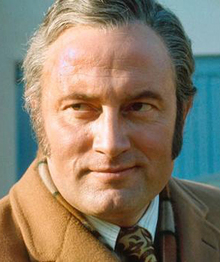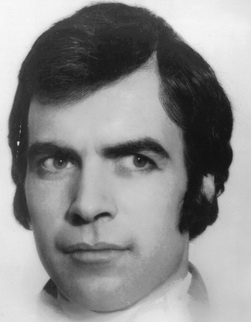Related Research Articles
The Scottish Renaissance was a mainly literary movement of the early to mid-20th century that can be seen as the Scottish version of modernism. It is sometimes referred to as the Scottish literary renaissance, although its influence went beyond literature into music, visual arts, and politics. The writers and artists of the Scottish Renaissance displayed a profound interest in both modern philosophy and technology, as well as incorporating folk influences, and a strong concern for the fate of Scotland's declining languages.

Iain Cuthbertson was a Scottish character actor and theatre director. He was known for his tall imposing build and also his distinctive gravelly, heavily accented voice. He had lead roles in The Borderers (1968–70),Tom Brown's Schooldays (1971), Budgie (1971–72), its spinoff Charles Endell Esquire (1979–80), Danger UXB (1979) and Sutherland's Law (1973–76), as well as the films The Railway Children (1970), and Gorillas in the Mist (1988). He guest starred in many prominent British shows including The Avengers, Dr. Finlay's Casebook, The Onedin Line, Survivors, Ripping Yarns, Doctor Who, Z-Cars, Juliet Bravo, Rab C. Nesbitt, Minder, Inspector Morse and Agatha Christie's Poirot.

James Bridie was the pseudonym of a Scottish playwright, screenwriter and physician whose real name was Osborne Henry Mavor. He took his pen-name from his paternal grandfather's first name and his grandmother's maiden name.
Daniela Nardini is a Scottish actress who played Anna Forbes in the BBC Two television series This Life. The role earned her a BAFTA Best Actress award in 1998 and also earned her a Scottish BAFTA. She won a second Scottish BAFTA in 2009 for her role in Annie Griffin's New Town.

The National Theatre of Scotland, established in 2006, is the national theatre company of Scotland. The company has no theatre building of its own; instead it tours work to theatres, village halls, schools and site-specific locations, both at home and internationally.
Gavin Greig (1856–1914) was a Scottish folksong collector, playwright, novelist and teacher.

Dr Robert Horne Shepherd was a Scottish broadcaster and author who was known for presenting shows on BBC Radio Scotland and for writing a column in Doric for Aberdeen's Press and Journal newspaper.

Theatre of United Kingdom plays an important part in British culture, and the countries that constitute the UK have had a vibrant tradition of theatre since the Renaissance with roots going back to the Roman occupation.
Black Watch is a play written by Gregory Burke and directed by John Tiffany as part of the first season of the National Theatre of Scotland.
Alan Wilkins was a Scottish playwright.

John Cairney was a Scottish stage, film and television actor who found fame through his one-man shows on Robert Burns, Robert Louis Stevenson, Robert Service, Charles Rennie Mackintosh and William McGonagall.
Ann Marie Di Mambro is a Scottish playwright and television screenwriter of Italian extraction. Her theatre plays have been performed widely; they are also published individually and in collections and are studied in schools for the Scottish curriculum's Higher Drama and English.

Theatre in Scotland refers to the history of the performing arts in Scotland, or those written, acted and produced by Scots. Scottish theatre generally falls into the Western theatre tradition, although many performances and plays have investigated other cultural areas. The main influences are from North America, England, Ireland and from Continental Europe. Scotland's theatrical arts were generally linked to the broader traditions of Scottish and English-language literature and to British and Irish theatre, American literature and theatrical artists. As a result of mass migration, both to and from Scotland, in the modern period, Scottish literature has been introduced to a global audience, and has also created an increasingly multicultural Scottish theatre.
Aberdeen Student Show is a comedy musical and theatrical show, staged annually in Aberdeen, Scotland.
John Richard Tiffany is an English theatre director. He directed the internationally successful productions Harry Potter and the Cursed Child, Black Watch and Once. He has won 2 Tony Awards, an Olivier Award, a Drama Desk Award and an Obie Award.
John Clark Milne (1897–1962) was a Scottish poet who wrote in the Doric dialect of the Scots language. He was also a teacher and educationalist. Some of his poetry was written for children.

Scottish literature in the eighteenth century is literature written in Scotland or by Scottish writers in the eighteenth century. It includes literature written in English, Scottish Gaelic and Scots, in forms including poetry, drama and novels. After the Union in 1707 Scottish literature developed a distinct national identity. Allan Ramsay led a "vernacular revival", the trend for pastoral poetry and developed the Habbie stanza. He was part of a community of poets working in Scots and English who included William Hamilton of Gilbertfield, Robert Crawford, Alexander Ross, William Hamilton of Bangour, Alison Rutherford Cockburn, and James Thomson. The eighteenth century was also a period of innovation in Gaelic vernacular poetry. Major figures included Rob Donn Mackay, Donnchadh Bàn Mac an t-Saoir, Uillean Ross and Alasdair mac Mhaighstir Alasdair, who helped inspire a new form of nature poetry. James Macpherson was the first Scottish poet to gain an international reputation, claiming to have found poetry written by Ossian. Robert Burns is widely regarded as the national poet.
Cora Bissett is a Scottish theatre director, playwright, actor and musician. As a director she has created Amada, Roadkill, Grit: The Martyn Bennett Story, Glasgow Girls and Room. As an actor she had regular appearances in the television programmes Rab C. Nesbitt and High Times. She is an associate director at the National Theatre of Scotland.
David Ireland is a Northern Irish-born playwright and actor, known for his award-winning plays Cyprus Avenue and Ulster American.

Coinneach Iain "Kenny" Boyle is a Scottish actor, playwright and novelist.
References
- ↑ Irish University Review. Irish University Press. 2002. p. 168.
- ↑ Robbie Shepherd (2006). Robbie Shepherd's Doric Columns. Birlinn, Limited. p. 134. ISBN 978-1-84158-524-6.
- ↑ Sandy Hobbs; Willie Thompson (25 May 2011). Out of the Burning House: Political Socialization in the Age of Affluence. Cambridge Scholars Publishing. pp. 48–. ISBN 978-1-4438-3047-8.
- ↑ London Theatre Record. I. Herbert. 1989. p. 16.
- ↑ Edi Swan (2006). His Majesty's Theatre: One Hundred Years of Glorious Damnation. Black & White Pub. p. 130. ISBN 978-1-84502-102-3.
- ↑ Lindsay, Morag (4 May 2012). "Remarkable legacy of leading Scottish playwright". Press and Journal.
- ↑ Shaw, Alison. "Obituary: Charles Barron, inspirational teacher had great love of the theatre". Scotsman. Retrieved 18 May 2012.
- ↑ "Charles Barron" [ permanent dead link ]. tes.co.uk.
- ↑ "Dragon Theatre Company Netherbow". Theatre Record. I. Herbert. 1992. p. 1266.
- ↑ "Doric playwrights offered £1000 prize". scotsman.com.
- "New prize for plays written in Doric". abdn.ac.uk
- "Charles Barron". Herald Scotland